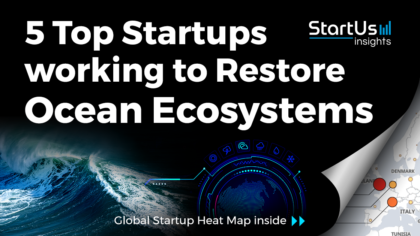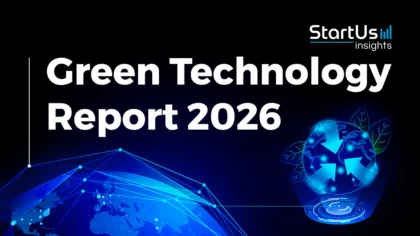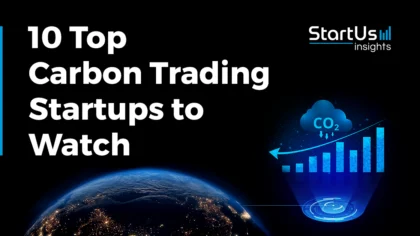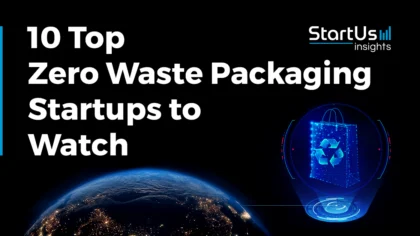Accelerate Productivity in 2025
Reignite Growth Despite the Global Slowdown
Staying ahead of the technology curve means strengthening our climate. That is why we give you data-driven innovation insights into technologies that mitigate the effects of climate change. This time, you get to discover 5 hand-picked startups developing solutions to restore ocean ecosystems.
Global Startup Heat Map highlights 5 Top Solutions Restoring Ocean Ecosystems out of 385
The insights of this data-driven analysis are derived from the Big Data & Artificial Intelligence-powered StartUs Insights Discovery Platform, covering 2.093.000+ startups & scaleups globally. The platform gives you an exhaustive overview of emerging technologies & relevant startups within a specific field in just a few clicks.
The Global Startup Heat Map below reveals the distribution of the 385 exemplary startups & scaleups we analyzed for this research. Further, it highlights 5 startups that we hand-picked based on criteria such as founding year, location, funding raised, and more. You get to explore the solutions of these 5 startups & scaleups in this report. For insights on the other 380 solutions restoring ocean ecosystems, get in touch.
tēnaka offers Corporate Social Responsibility (CSR) Programs for Ocean Regeneration
With a steep increase in anthropogenic greenhouse gases (GHG) emissions, such as carbon dioxide, in the atmosphere, more heat is imparting into the ocean. This, in effect, is increasing the ocean temperature as well as the sea surface heat. The increase in temperature levels further leads to alterations in climate patterns, affecting aquatic life quality. With more heat trapped in the ocean, there is a significant increase in sea level and storms, affecting coastal communities.
Tēnaka is a French startup that provides tailored ocean regeneration programs for corporate social responsibility regulations. The startup uses nature-based solutions to restore mangrove and coral reefs. This allows corporates to integrate a regenerative workflow into their business models. Further, the Tēnaka Science platform enables users to track their company’s carbon footprint and impact measurement tools through data visualization.
CCell provides Artificial Coral Generation
Healthy coral reefs often play a role as natural indicators of a healthy oceanic environment. Moreover, the corals provide food for a wide range of fish species and are often termed the ‘rainforests of the sea’ for their high biodiversity. However, due to human-made threats such as pollution, sedimentation, and climate change, the ocean temperature is rising, causing ocean acidification. This leads to coral bleaching and possible death. That is why startups are offering solutions to improve coral health, as well as culture coral reefs in nurseries to restore ocean health.
British startup CCell grows artificial coral reefs using seawater minerals and renewable power to protect coasts from erosion and enhance the marine ecosystem. The CCell-Wave generates wind energy and is made of composite materials that are able to withstand extreme conditions. Upon energy generation, the startup’s smart power management (SPM) system optimizes the output voltage suitable for coral reef elaboration. CCell’s solution extracts calcium carbonate from seawater using electrolysis, in which a steel structure supports the growth. The startup’s solutions enable coral reef regeneration at coasts, thus promoting a healthy ecosystem as well as tourism.
planblue develops Underwater Satellites for Seafloor Mapping
Scope definition is a critical part while choosing an ocean regeneration strategy. For example, action plans to protect phytoplankton on the sea surface are different from regenerating coral reefs. That is why ocean ecosystem analysis is essential for restoration activities. Unlike land surveying, using satellites to monitor the ocean ecosystem is impossible. Startups aid this situation by offering underwater ecosystem monitoring solutions for seas and oceans.
German startup planblue builds a global seafloor database with the use of underwater satellites. The startup uses hyperspectral and RGB imaging with underwater navigation and Artificial Intelligence to scan and map the seafloor automatically. The users are able to train the system to identify and map plastic waste pollution on the seafloor, the effectiveness of seafloor restoration efforts, and the impact of climate change. planblue’s cost-efficient automated analysis solutions offer geo-referenced data and interactive seafloor maps for fast seafloor coverage and monitoring.
Innovasea creates Open Ocean Precision Aquaculture Solutions
Climate change is modifying fish distribution and the productivity of marine species. Meanwhile, overfishing is disrupting the global fishery population. As a path to sustainable seafood production, fisheries are opting for inshore and offshore aquaculture. However, the discarded nutrients and feces from aquaculture farms are still released into the environment, which negatively affects their ecological impact. To this end, startups now develop aquaculture solutions to optimize food development and waste generation.
Innovasea is a US-based startup that provides open ocean and land aquaculture solutions for sustainable food production. The startup’s open ocean precision aquaculture solutions integrate submersible pens and other hardware with intelligent sensors, cameras, and environmental monitoring systems. Innovasea also utilizes predictive modeling and machine learning to optimize food production. Further, the startup supports farmers with aquaculture intelligence and fish tracking that allow production process optimization, thus reducing overall costs.
#tide ocean material upcycles Ocean-bound Plastic Waste
Apart from the rising seawater temperature and acidification, waste accumulation is a severe threat to cetaceans, marine life, and human beings. Even though marine litter consists of textile wastes, fishing nets, and industrial wastes, plastic is the most predominant among marine trash. Startups build waste management solutions to pull out plastic from the ocean to reduce the microplastic concentration that affects aquatic ecosystems.
Swiss startup #tide ocean material upcycles ocean-bound plastic waste and transforms it into high-value raw material for new sustainable products. The startup oversees a global network with fishers and a complete supply chain to facilitate plastic collection from the seas. Further, #tide uses a proprietary plastic processing method to upcycle the collected plastic into #tide granules, yarn, and filament, for 3D printing. This allows sustainable brands to use their products as raw materials and develop products with a lower carbon footprint at reduced capital expenses.
Discover more Startups tackling the Effects of Climate Change
Startups such as the examples highlighted in this report focus on repurposing and repair solutions as well as conservation and restoration of ecosystems. While all of these technologies play a major role in fighting climate change, they only represent the tip of the iceberg. To explore more climate-friendly technologies, simply get in touch to let us look into your areas of interest. For a more general overview, you can download one of our free Industry Innovation Reports to save your time and improve strategic decision-making.








